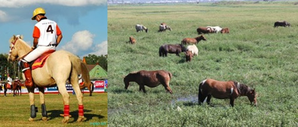Manipur govt allots 30-acre grassland to conserve endangered 'polo ponies'
By IANS | Published: May 15, 2024 06:16 PM2024-05-15T18:16:14+5:302024-05-15T18:20:05+5:30
Imphal, May 15 The Manipur government has taken measures, including the allotment of grassland, to protect the state’s ...

Manipur govt allots 30-acre grassland to conserve endangered 'polo ponies'
Imphal, May 15 The Manipur government has taken measures, including the allotment of grassland, to protect the state’s endangered 'polo ponies', which are a diminutive yet robust breed that holds special significance as the backbone of the sport of Polo, originating right here in the northeastern state.
Officials said the Manipur government has now allotted 30 acres of grassland to conserve the endangered species at Lamphelpat in Imphal West district.
Announcing the government’s latest step, Chief Minister N. Biren Singh said in a post on X: “To protect the endangered Manipuri Pony, they are now being given a new home at the government allotted 30 acres of grassy fields at Lamphelpat, Imphal West, where they can freely roam and graze.
“The state government has been taking various measures to protect the Manipuri Pony, which is closely tied to the state’s history and culture. We gave the game of modern polo to the world, and considering the importance of this animal, their preservation requires support from the masses.
"I also appreciate the Manipur Horse Riding and Polo Association for its initiative to save the precious yet endangered Manipuri Pony."
There are around 26 polo clubs in Manipur. One of them, the Manipur Horse Riding and Polo Association, which was established in 2005 with 34 ponies, also functions as a stud farm for ponies.
Officials said as per the 20th Livestock Census conducted by the Manipur government, only 1,089 ponies remained in the state after the death of many horses in the last 16 years.
The Manipur government declared ponies as an endangered species in 2013 and since then, the numbers have plummeted from around 1,218 in 2007 to the current 1089, as per the Livestock Census conducted last year.
Despite concerted efforts by the state government to conserve these iconic animals, their population continues to dwindle due to various reasons, posing a grave challenge for the struggling pony owners.
Though the ponies are a source of great pride for the people of Manipur, the number of animals is gradually declining or inching towards extinction, with an annual decline of at least eight ponies, according to the census data.
Thangjam Basanta, the owner of 15 polo ponies, expressed his deep concern over the fast decline in numbers, attributing it to diverse factors with dwindling grazing grounds being the most critical.
"Like other states, there are no grazing grounds left in the urban and semi-urban areas of Manipur as they have been encroached upon by humans for so-called developmental projects and construction of houses. Where should one feed the ponies," asks Basanta, who is an avid polo player himself.
Though polo is considered a 'rich man's game' elsewhere in the country, in Manipur, it is predominantly played by the commoners, often coming from economically challenged backgrounds.
Most polo pony owners face substantial financial burdens, exacerbated by the absence of government schemes to aid in their upkeep.
“Revival of grazing and polo grounds is urgently needed to save the sport and the polo pony culture in Manipur,” emphasised Sarangthem Abung, a pony owner from Imphal West district, stressing the importance of government incentives for pony owners.
Located in Imphal, the iconic Hapta Kangjeibung, one of the world’s oldest polo courses and practice grounds, has been inaccessible to polo players since 2011 after it was converted into a fairground and for use by the political parties for large gatherings.
Both Basanta and Abung feel that Hapta Kangjeibung should be allowed to be used as a practice ground to rejuvenate the diminishing polo culture in the state.
The absence of government incentives compounds the financial challenges faced by the pony owners as they struggle to raise money for treatment, fodder supply, and stable maintenance of their trusted steeds.
Another accomplished polo player, Doren Singh, who owns 13 ponies, feels that any conservation policy must address the dearth of grazing and practice grounds.
He also called for government incentives for individual pony owners, akin to those provided to the polo clubs.
To lift the status of polo ponies, the Manipur government introduced the Manipur Pony Conservation and Development Policy in 2016, offering incentives to polo clubs.
Joint Director in the Directorate of Veterinary and Animal Husbandry, R.K. Khogendra Singh, attributed the decline of polo ponies to their underutilisation.
Emphasising that awareness, starting from the grassroots level, is imperative for pony conservation, Khogendra Singh said, "Preserving the Manipuri pony is not solely the obligation of the department, it is a collective responsibility. Comprehensive awareness needs to be instilled from the grassroots level by incorporating the pony's narrative into the school curriculum.”
Quoting last year’s Livestock Census data, the official said that Imphal West district has the highest number of ponies at 619, followed by Imphal East (266), Bishnupur (97), Tamenglong (75), and other districts.
According to the census, in 2007, the district-wise pony numbers were -- Imphal West (302), Thoubal (280), Senapati (229), Bishnupur (115), Churachandpur (85), Chandel (64), Tamenglong (54), Ukhrul (54), and Imphal East (35).
At that time, the overall count of ponies in the state stood at 1218.
Despite the efforts of the Manipur Police proposing a mounted unit at every police station to increase pony numbers, progress has been hindered due to the prevailing situation in Manipur.
Among the northeastern states, distinct and pure horse breed is found only in Manipur.
The Manipuri Pony is acknowledged as one of the five indigenous equine breeds in India, alongside Marwari, Kathiawari, Zanskari, and Spiti.
Disclaimer: This post has been auto-published from an agency feed without any modifications to the text and has not been reviewed by an editor
Open in app